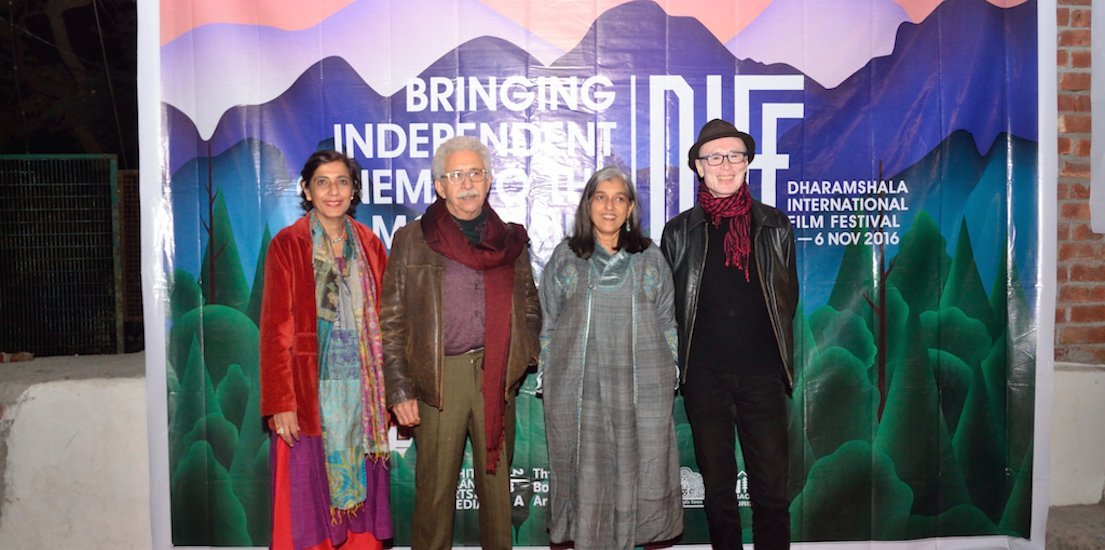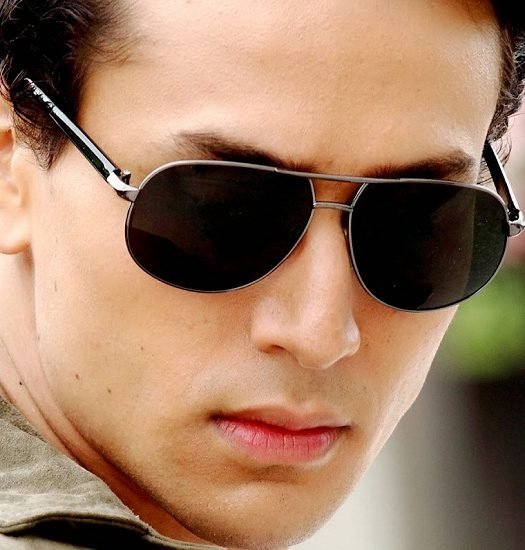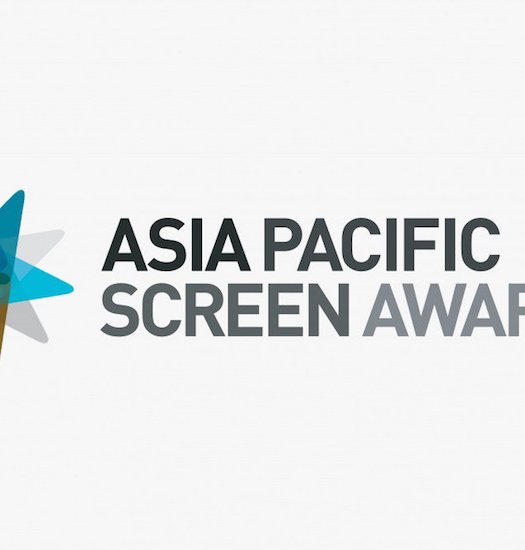DIFF 2016 concludes on high note with screening of Visaranai
"This festival truly is a celebration of cinema rather than a market place where you are trying to hustle. I would love to be back here in future”, said Naseeruddin Shah who also was the first time attendee of DIFF
The 5th Dharamshala International Film Festival (DIFF) 2016 concluded on a high note with the screening of three Large Short Films, Anurag Kashyap’s That Day After Every Day starring Radhika Apte, Adhiraj Bose’s Interior Café Night starring Naseeruddin Shah, Shernaz Patel and Naveen Kasturi and Jyothi Kapur Das’ Chutney starring Adil Hussain.
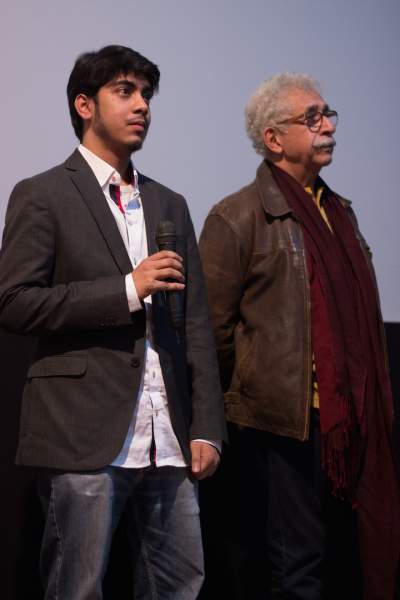
Director Adhiraj Bose with veteran actor Naseeruddin Shah.
The four days film festival was held at TCV, McLeodganj, Dharamshala from 3-6 November 2016.
The programme is curated by Festival Directors Ritu Sarin and Tenzing Sonam. They were joined this year by Associate Director Raman Chawla, filmmaker Umesh Kulkarni (programmer for the Shorts section), and Children’s Media Specialist, Monica Wahi (programmer of the Children’s Films section).
Apart from getting high on the eclectic mix of films, documentaries and shorts from across the globe, the film enthusiasts enjoyed the engaging and insightful sessions with the veteran filmmaker Saeed Mirza in conversation with Aseem Chhabra: Saeed Mirza Ko Gussa Kyu Aata Hai and the veteran actor Naseeruddin Shah in conversation with Rajeev Masand: Between Art And Industry.
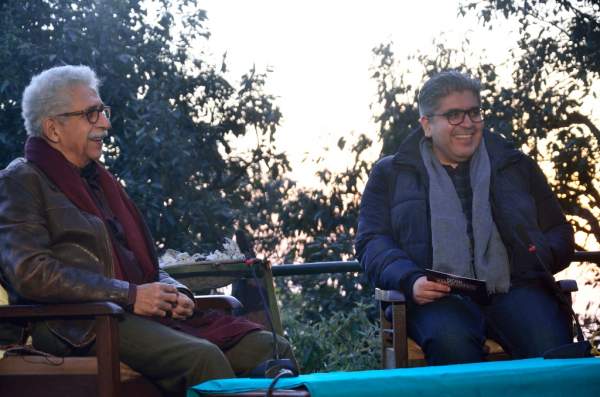
Actor Naseeruddin Shah with Rajeev Masand at DIFF 2016
Naseeruddin Shah who attended DIFF for the first time, was accompanied by his wife Ratna Pathak. The veteran actor who came for the screening of his short film, Interior Café Night directed by Adhiraj Bose was all praise for the festival. “I am not a great fan of film festivals and I seldom attend them as I find them too busy and there is too much hot air all around. This is truly the first film festival I have ever been to which I enjoyed. This festival truly is a celebration of cinema rather than a market place where you are trying to hustle. I would love to be back here in future” he said.
“I, as a person, have walked away from films and DIFF has re-engaged me with cinema. The selection of the films is incredible and the Dharmshala’s charm adds to it and I have never seen a friendlier bunch of volunteers at any festival “said veteran filmmaker Saeed Mirza who also attended DIFF for the first time.
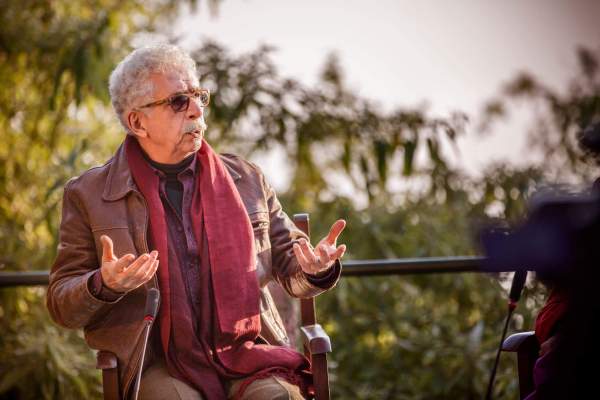
Naseeruddin Shah at DIFF 2016
Interior Cafe director, Adhiraj Bose said, “I am so excited this happened. It’s our 23rd film festival, but I have to take this opportunity to say that this is one of the best, in terms of organisation and everything and I genuinely mean it when I say that, and I hope to come back again next year.”
Marathi films, Umesh Kulkarni’s Highway and Magesh Joshi’s Lathe Joshi, Bhutanese film HemaHema: Sing Me A Song While I Wait,Mickey Lemle’s documentary, The Last Dalai Lama?,were the crowd pleasers of the day.
The National award winner Marathi filmmaker Umesh Kulkarni who has curated the shorts films at DIFF for the last four editions and is back at the fest with his award-winning film Highway which was screened to a packed house of audience said, “I look for the diversity in short films. This year’s selection has a Punjabi film, a Marathi film, a Himachali film and a film made in Darjeeling and Hyderabad. At DIFF, we get a very good audience short films. Even the morning shows were house full.”
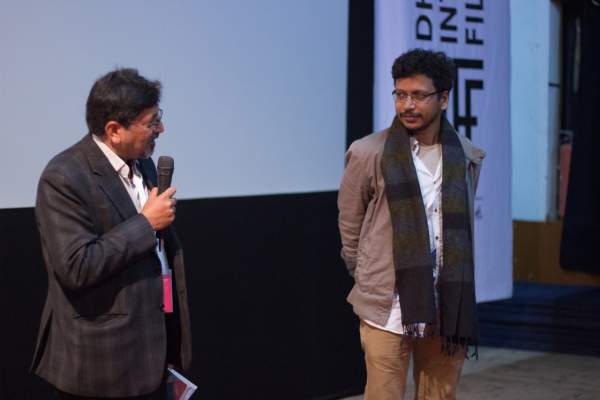
Marathi Filmmaker Umesh Kulkarni (L) with Raman Chawla (R) at DIFF 2016.
Omnibus feature narrative, Ten Years (Cantonese) and The Last Dalai Lama had their Indian premiere at DIFF 2016.
A Panel discussion, ‘Invisible People: Questions Of Identity and Belonging’ with international filmmakers, Pimpaka Towira (genre-twisting Thai road movie The Island Funeral), Boo Junfeng (acclaimed Singapore prison drama, Apprentice, nominated as Singapore’s Oscar entry for the foreign language film) and exile Tibetan filmmaker Tenzin Dasel (short docu-fiction, Royal Café in French), Chow Kwun-wai (Omnibus feature narrative, Ten Years) and Rokhsareh Ghaem Maghami (Iranian docu-feature Sonita) was moderated by DIFF co-director, Tenzing Sonam.
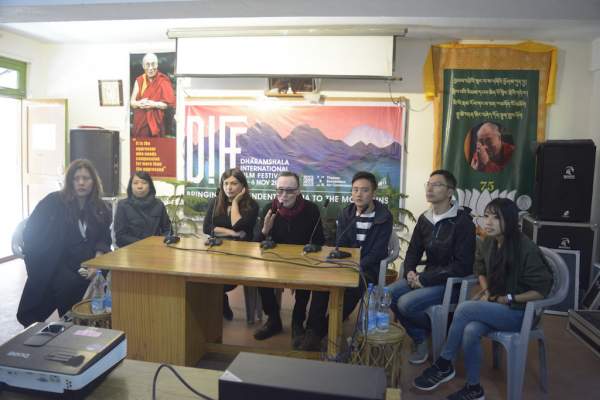
Panel Discussion at DIFF 2016
Festival director Ritu Sarin said, “DIFF 2016 was the best so far. The audiences, who came from all over India and the world, were simply fantastic! We had more filmmakers attending then ever before. The two conversations with Naseeruddin Shah and Saeed Mirza were the icing on the cake. Our volunteers were brilliant. Everyone had a great time. What more can I say? Now, it’s time to look forward to DIFF 2017.”
Presented in collaboration with Thyssen-Bornemisza Art Contemporary, the festival is also supported by the Himachal Pradesh government and the National Film Development Corporation of India.
This year, DIFF proudly presented, with its long-term collaborator Thyssen-Bornemisza Art Contemporary (Vienna), a selection of single-channel video installations from its private collection: Palestinian artist duo, Basel Abbas and Ruanne Abou-Rahme’s Collapse and The Incidental Insurgents (Parts 1 and 2), and Ritu Sarin and Tenzing Sonam’s Some Questions on the Nature of Your Existence.
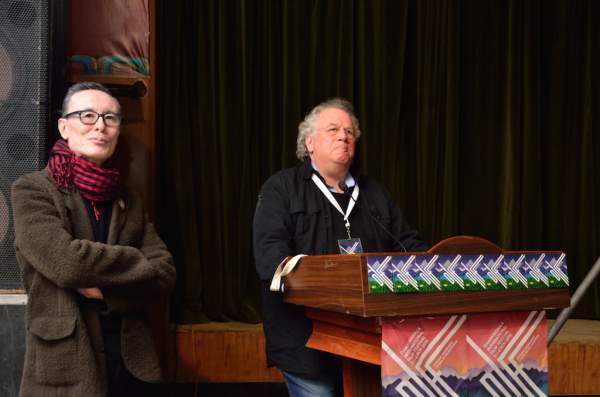
Tenzing Sonam with Director Mickey Lemle
As part of DIFF’s community outreach programme, screenings were organised in local villages, including Dharamkot, Heini and Rakked, and at the District Jail in Lower Dharamshala. A special screening was held for students from Harmony Through Education—a thriving school for children and young adults with special educational needs—together with students from local mainstream schools. Other outreach programmes included a film appreciation competition for 20 school students from four local schools, invitations for local schools and colleges to festival screenings, and large-scale community screenings in collaboration with Jagori Rural Charitable Trust.
In keeping with the spirit of DIFF, this year’s programme included feature films, shorts, children’s films, video installations, masterclasses, conversations, panel discussions, and community outreach events, thus offering a selection of the best of contemporary independent cinema.
The programme for 2016 included 43 films, which included 27 feature films (18 narratives and nine documentaries), 15 short films, and one medium docu-fiction. 20 filmmakers, including nine international filmmakers, attended DIFF to present their films. 21 countries were represented with 18 films having their India premieres, including two world premieres and one Asian premiere.

